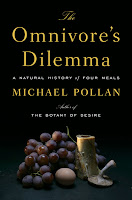Hello Foodies! Beginning today, if you are one of the first two students to comment on a blog post (not including this one, but including previous posts), you will win a cool sustainable prize! So start typing and we will contact you if you win. Please e-mail us your post (after you post it on the blog) to caldsec@gmail.com so we can contact you!
The blog is updated about once a week, so check up for new posts periodically.
-Your DSECs
*To win, comments must be relevant to the post and demonstrate some insight. Comments will be moderated for appropriateness.*
Wednesday, October 28, 2009
Wednesday, October 21, 2009
Tray-Less is Sexy!
Tray-less is Sexy.
Really it is. Read this post to find out why.
For those who have not heard, Crossroads and CKC are going Tray-less every Friday in October. The Residence Hall Association is tabling both to inform students about why the trays are being taken away and to garner student support for the Tray-less movement with surveys and a petition.
What started the movement to go Tray-less and why should Cal students join in?
Colleges and universities across the nation are ditching trays as a way to cutback on food, energy and water waste. Schools that have implemented Tray-less dining include NYU, University of North Carolina, University of Florida, Stanford, and Cornell. In most cases, the food and water savings are immense.
Williams College in Massachusetts is saving an estimated 14,000 gallons of water annually since eliminating trays at one of their four dining halls in Spring 2008. The Rochester Institute of Technology estimates that they spend 10% less on food since eliminating trays, even though food costs are rising.
We (the DSECs) are in the process of taking data for how much tray-less dining reduces food waste in the dining commons by measuring the ounces of food waste per student on tray-less nights compared to other nights. Keep checking this blog for updates! And please vote on our online poll, even if the thought of tray-less makes you cringe.
Sources:
Read more!
Monday, October 5, 2009
Michael Pollan Speaks at Zellerbach

Michael Pollan, author of The Omnivore's Dilemma and Knight Professor of Science and Environmental Journalism at UC Berkeley spoke to the Berkeley Community on Wednesday evening about the “omnivore’s solution.” Pollan asks, “ What do we know about the links between what we eat and our own health? You can’t have a healthy diet without a healthy agriculture.” The problem is that when it comes to choosing what to eat, he says, “we are lost.”
Pollan began by unloading a few plastic Safeway bags of goodies that included Twinkies, Froot Loops, nutrition bars, and whole wheat Wonder Bread; products he argues are not food, but rather “edible food-like substances.” Needless to say, by the end of his presentation, he had most of the audience convinced as well.
But if these products do not constitute real food, what is real food anyway? And how do we eat healthfully without falling victim to one fad diet or another? Pollan addresses this with four basic rules: 1. If your grandma and/or great grandmother would not recognize it as food, it is not food. 2. If it has more than five ingredients it is not food. 3. Avoid any food you have ever seen advertised on television 4. Stop eating before you are full.
Pollan provides much background for how we got to this point of confusion with food in the first place. He asks, for instance, how does America, whose population worries about dietary health more than any other country in the world, also have the worst dietary health in the word. He argues that one of the greatest culprits is nutritionism, a concept in which “the key to understanding any food is the nutrients it contains.” With nutritionism, we suddenly need experts to tell us what to eat, and nutrients are divided into good and evil nutrients. Processed foods, then, have an edge over natural foods because they can alter their nutritional content. This creates a confusion in which people may eat foods higher in sugar because they are lower in fat, or vice versa, and have health problems all the same.
To resolve this dilemma, Pollan says, people need to reevaluate not just how they eat but why they eat. This will include returning to the diet and lifestyles of our ancestors who ate not just for health, but also for “community, pleasure and social identity.” People need to leave the packaged, processed foods of their supermarkets in favor of fresh produce from local farmers markets. Pollan argues that individual health, community health, and environmental health are all interrelated. What is best for our personal health is also best for our agriculture and the climate. He urges people to vote with their forks, or “food dollars”.
Pollan sums up his dietary advice with his famous, seven-word mantra: “eat food, not to much, mostly plants.”
photo from michaelpollan.com
Read more!
Subscribe to:
Comments (Atom)




